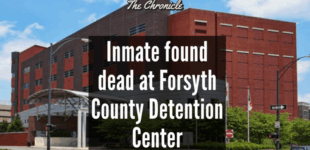W-S Fair Housing Summit highlights innovative solutions, legislative efforts for homeownership

By Jess Schnur
The Chronicle
On April 24, 2025 at the Benton Convention Center, the 19th annual Fair Housing Summit was held by the Winston-Salem Human Relations Department. Together alongside various organizations, for-profit and nonprofit alike, and community leaders who specialize in fair housing, the summit serves to provide information and resources to these affiliates so that they may better serve their community in the pursuit of homeownership.
“We want to ensure that through our efforts, through our resources, that we are actually giving everyone in the community an opportunity to have fair housing, to achieve the American dream of home ownership, to work through the different policies and procedures to find out how we can best move and serve our community,” said Dr. Ronnie Christian, the interim director of the Human Relations Department, in an interview with The Chronicle.
During last Thursdays luncheon, the Breaking Barriers Fair Housing Award was presented to The Center for Home Ownership, an organization under Financial Pathways of the Piedmont, that since 2002 has provided education, information on financing options, community housing, and available homes to those looking to transition from renting to buying in the local community. This honor is awarded to organizations that have actively advocated for accessible, fair housing while consistently committing themselves to helping individuals in the community achieve their goals of homeownership.
See a need, fill a need
Much of the information shared at the summit serves to help identify disparities in systematic sectors that bar the possibility of homeownership for many local individuals. In accordance with this year’s theme, “Preparing for Change in an Ever-changing Fair Housing World,” keynote speaker Dr. Renée Norris, the eviction mediation program coordinator at the University of North Carolina, Greensboro (UNCG) Center for Housing and Community Studies, presented findings through her work which reflect the contributing barriers in communities’ inaccessible housing market.
Housing, like many issues, is a symbiotic relationship to other legislative systems, such as transportation. Dr. Norris, in her address, challenged summit attendees to supplement creative solutions in their practices to help support housing’s complex avenues.
“I think one of the things we need to do is look at some unusual funding opportunities, look at businesses to see if they have some foundations that they, when something you say or propose, would be something (they) would want to do. Because one of the things that I think about is that a lot of businesses say, ‘We can’t find enough workers for our businesses.’ And a lot of times it’s tied into the transportation system or the housing,” said Dr. Norris in her address. “So, it’s like, well, it may be if we could get them to say, ‘You know what? Investing in affordable housing is also a way to make our business better because then we could have a pool of employees who don’t have the challenges of getting to work in the first place.’ So, I was just thinking that we can all sort of work together, come up with unusual ideas and messages to various organizations and businesses.”
With her department’s focus largely revolving around eviction mediation, in 2023 a survey was conducted through the program’s landlord outreach specialist, Tara Tillman. Through a sample of Guilford County property managers and landlords of over 4,000 properties, 80% claimed that they were more likely to rent to individuals with a history of eviction who were provided budgeting and property education, rather than if they had been provided rental assistance after their eviction. Tillman, who had a background in real estate, concluded that landlords valued those who took steps to learn from their eviction over those who could secure guaranteed income.
Dr. Norris and her department also identified the increasing rent hikes among stagnant wages, the continual cycle of job loss, and the financial struggles for those affected by health issues, as many of the leading obstacles to housing across communities. Through her work with UNCG, she and her team identify resources, education and intermediation with local landlords to combat these barriers.
“Remember our Declaration of Independence. Remember our Constitution and Bill of Rights,” said Dr. Norris. “We were founded with certain principles that no lone administration can change if we remember our power. The words of our Declaration of Independence and Constitution were powerful words by imperfect people, which has sustained and encouraged this country to do better, be better.”
A hope for a more equitable future
As the summit began to draw to a close, Dr. Alex Boston, the director of legal services and risk management at the Housing Authority of Winston-Salem, expressed the need for hope to remain unwavering within the uncertainties of the current political climate. He brought attention to the various legislative proposals currently underway that aim to enact change for a more accessible housing market for all. In his speech, Dr. Boston detailed the proposed Housing Choice Act, which incentivizes municipalities to adopt a range of pro-housing reforms, including more actively permitting accessory dwelling units (ADUs), expanding zoning requirements, and eliminating parking mandates, thus aligning zoning policy to better implement housing policy; to the Allow Housing Near Jobs Act, which would allow housing to be established in areas currently zoned as commercial to eliminate the need for a transportation stipulation to bar job opportunities.
He also noted two additional bills, one aimed at addressing and supplementing the diminishing supply of middle housing through requiring cities to permit duplexes, quads and sixplexes in all residential zones. The other seeks to reform the building code for single-stair multi-family buildings, promoting the construction of smaller multi-family dwellings with a single stairwell, thus reducing building costs, increasing the feasibility of infill development in urban areas to allow for more housing to be built, and making units such as these more livable for their residents.
“Housing policy is economic policy. Housing policy is climate policy. Housing policy is health policy. It is infrastructure policy. And crucially, it is civil rights policy,” Dr. Boston concluded. “In my work, I see every day how this interacts.
“And yes, so the challenges are significant, from the cost of land, materials, structural inequalities that continue to shape who gets to live where, but the tools are within our reach to make people’s lives better.”











